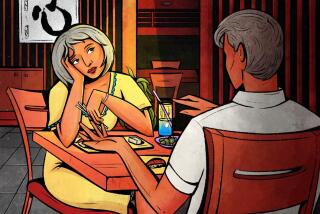COLUMN LEFT/ ALEXANDER COCKBURN : A Ruritanian Plot Against Prince Charles : Scotland Yard bodyguards had the equipment to overhear royal phone indiscretions.
- Share via
There had been unflattering speculation about his manhood, but Prince Charles, a chap once thought to be more at ease conversing with daffodils than women, now stands revealed as the most ardent royal lover since Anne Boleyn caught the eye of Henry VIII.
The transcript of a 1989 phone conversation between the prince and Camilla Parker-Bowles has now been published in full by an Australian publication, New Idea. It discloses a couple who have had an on-and-off relationship for well over a decade talking in the hothouse lingo of unbridled upper-class English passion.
Charles: The trouble is I need you several times a week.
Camilla: Mmm. So do I. I need you all the week. All the time.
Charles: Oh, God, I’ll just live inside your trousers or something. It would be much easier.
Camilla: (Laughs.) What are you going to turn into, a pair of knickers? (Both laugh.) . . . Oh darling! . . . I just want you now.
And so on and so forth. It’s not the language of Keats, but has passion all the same.
Camilla demonstrates she knows how to hold her man, asking him to send her copies of his old speeches, telling him that “as usual, you’re underestimating yourself.” For his part, countermanding her remark that she’s “never achieved anything,” Charles announces grandly, “Your great achievement is to love me.” They say good night to each other 28 times in succession, as people in such circumstances often do.
In Britain there’s been a good deal of clucking about this disclosure of Charles as coarse adulterer being the final straw breaking the camel’s back, destroying the last vestiges of popular respect for the House of Windsor.
The error here is to suppose that popular respect for royalty has been a constant in British history. For most of their career through the past four centuries, the successive royal houses--Stuart, Orange, Hanover, Windsor--have been regarded with ribald lese-majeste. When Charles’ ancestor, Edward, also Prince of Wales at the time, was enmeshed in a late 19th-Century gambling scandal and paid a royal visit to some poor section of Manchester, the inhabitants hung a banner across the street: “Welcome to our prince, but no gambling please.”
So there’s no great reason to suppose that the Windsors are finished or that Charles will be forced to step aside and cede the succession to his son William.
But amid these commotions in Ruritania, there is reason to suppose that Charles’ present discomfiture may have more sinister antecedents than his folly--the Windsors never were a bright lot--in imagining that one can have a secure conversation on a cellular phone.
By the mid- to late-1980s, amid the flood tide of Thatcherism, the royal family stood in virtually overt opposition to the political agenda of the Conservative prime minister. The queen let it be known that she considered the harsh policy toward the coal miners in the conflicts of 1984-85 to be unwise. Charles was more vocal.
He paid conspicuous visits to inner-city slum shelters, attacked the commercialism and debased values of ‘80s capitalism and even hinted that he supported the Campaign for Nuclear Disarmament. Downing Street successfully urged that he be required to make a strong speech in support of NATO.
By some miracle, Charles had managed to develop the world outlook of the late ‘60s-early ‘70s counterculture, fusing the economic values of E.F. (“Small Is Beautiful”) Schumacher with a New Age environmental cosmology out of Laurens van der Post and the Green movement.
None of this earned him the admiration of Downing Street nor of the less alluring sectors of the permanent government.
Nor is the royal family popular with its police bodyguards from Scotland Yard’s Special Branch. All of the royal conversations thus far intercepted and published (Diana had a famously indiscreet chat with a male friend, published last year) dated from late 1989 or early 1990. There is evidence to suggest that the interceptors and purveyors came from among these same Special Branch bodyguards, who had much special electronic equipment no longer needed for surveillance of East European and Soviet embassies.
It can even be noted that the latest Camilla tape was first published in an Australian publication owned by Rupert Murdoch, a press mogul hostile to the monarchy and indeed thoroughly attuned to Thatcherite values. Thus does Ruritanian romance shade into less Ruritanian conspiracy, in which a prince now languishes in popular ridicule.
More to Read
Sign up for Essential California
The most important California stories and recommendations in your inbox every morning.
You may occasionally receive promotional content from the Los Angeles Times.









